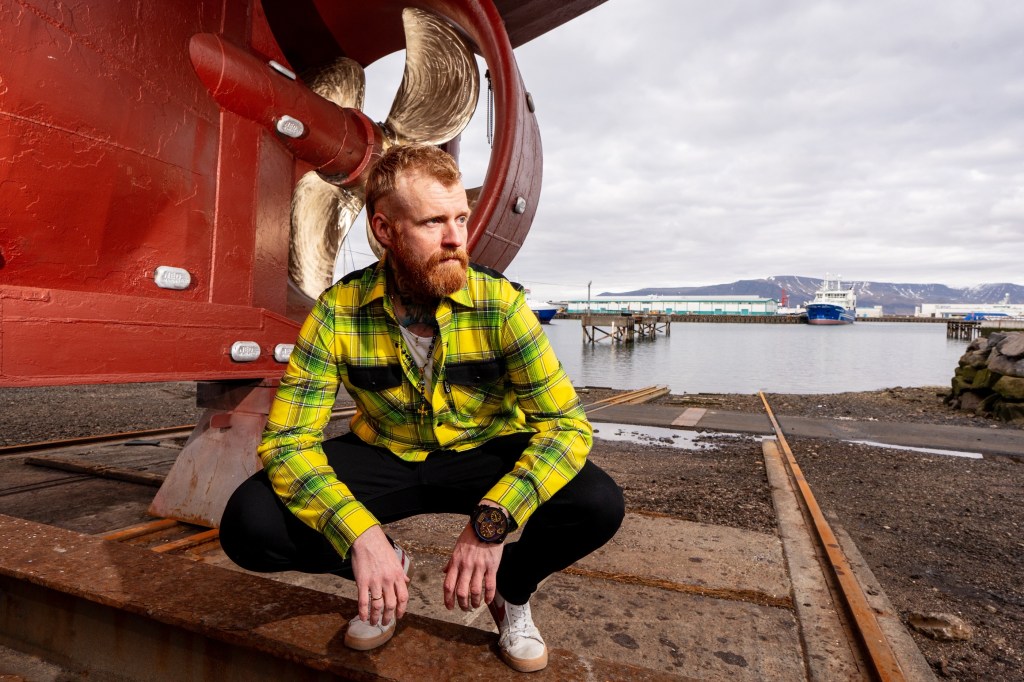The UK’s High Court has rejected a final appeal by the Icelandic artist Oddur Eysteinn Friðriksson, known as ODEE. He was trying to retain ownership of a conceptual artwork in the form of a website apologizing on behalf of Iceland’s largest fishing company, Samherji, for its alleged role in the so-called Fishrot scandal.
ODEE made the work, titled We’re Sorry, in 2023. It was a fake UK-registered website replicating Samherji’s official website, but with the artwork’s title plastered in large font across the homepage.
The Fishrot scandal takes its name from a cache of over 30,000 documents leaked by a former Samherij employee in Namibia and published by Wikileaks in November 2019. The “Fishrot Files” detail email correspondence between Samherji’s employees suggesting that the company paid millions of dollars in bribes to high-ranking politicians and officials in Namibia to acquire the southern African nation’s fishing quota.
Samherji had strongly denied allegations of bribery and the ten accused Namibian officials have protested their innocence amid detention for over five years. The case hit Namibia’s high court at the end of 2023. Earlier this month, the Icelandic District Prosecutor concluded its inquiry into Samherji’s activities in Namibia. The prosecutor is yet to decide whether any charges will be brought against any of the defendants.
In Tuesday’s ruling in London, judge Anthony Mann upheld a previous order sought by Samherji requiring ODEE to give up control of the website, including access to the domain. While Mann accepted that the artist had not sought to make commercial gain from the digital artwork, he ruled that the website was not a parody. The judge added that ODEE could not count on the protection of Article 10 of the Human Rights Act regarding freedom of expression as the website had been “an instrument of fraud.”
“Whether We’re Sorry is ruled against in the High Court in London has no bearing on its artistic value,” ODEE told ARTnews. “In fact, its artistic value only increases. Here, Samherji has bared its teeth for the world to see. If this ruling were allowed to stand, then artworks by Andy Warhol, Banksy, and others would likewise be deemed illegal. That’s why it’s essential that this case proceeds to Strasbourg, where it can have the greatest impact. With my lawyers, I have already begun preparations to take the case to the European Court of Human Rights. Contemporary artists must be able to express themselves on matters of public concern.”
Samherji did not respond to a request for comment from ARTnews.
ODEE is represented by two lawyers from the International Lawyers Project (ILP). Ewa van Der Merwe, the firm’s senior programmes director, told The Art Newspaper that Samherji “intentionally brought these proceedings in the UK [using litigation to] suppress his artwork and exposure of their leadership’s involvement in the biggest corruption scandal in Namibian and Icelandic history.”
Related Articles

“ILP responded by organising emergency legal representation so that Odee—and artists in his position—can defend themselves against powerful corporations,” van Der Merwe added.
Last November, a judge in the UK ruled in favor of Samherji after it sued ODEE for creating the apologetic website. The decision came after a hearing in London two months earlier, when Samherji accused the artist of intellectual copyright and malicious falsehood, among other charges. Samherji was also seeking damages and demanded a summary judgement to decide the outcome without a trial, which the judge accepted.
During that hearing, ODEE told the judge that his conceptual artistic practice was “culture jamming,” a form of activism which subverts the corporate tools of advertising to challenge prevailing cultural narratives. In response, Samherji argued that culture jamming did not fall under the Oxford English Dictionary’s definition of art and that We’re Sorry was therefore not a legitimate artwork.
After the judge’s decision in November, Samherji’s then-CEO, Thorsteinn Már Baldvinsson, said he was “satisfied” with the result.
“We were forced to take legal action to protect our trademark when all other lenient resolutions were rejected,” he said in a statement. “The ruling clearly distinguishes between legitimate artistic expression and the misuse of a registered trademark. This judgment must be a matter of serious consideration for the academic institutions that gave their blessing to obvious trademark violations under the guise of artistic expression.”
Baldvinsson stepped down as CEO in May to be replaced by his son, Baldvin.

